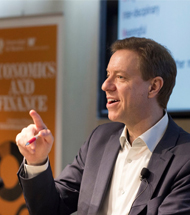Antonio Moreno: “Lack of Political Agreement in Spain Costing a Lot of Money: 40 Basis Points Since December 2015”
Recent Political Developments and Crisis in First Workshop Held by Master's Degree in Economics and Finance

The Master's Degree in Economics and Finance taught at the University of Navarra's School of Economics and Business Administration has organized its first professional workshop at Banco Sabadell's Madrid office with the title Advances in Macroeconomics and Finance. Antonio Moreno, Faculty Member in the University of Navarra School of Economics and Business Administration, addressed the political risks that are threatening the economy and their impact on foreign direct investment. He explained, “The lack of political agreement in Spain is costing us a lot of money: 40 basis points since December 2015.”
Dr. Moreno cited examples such as the expropriation of YPF in Argentina in April 2012 and the nationalization of Spanish company Red Eléctrica by Bolivian president Evo Morales. He went on to argue, “The relevance of measuring international political risk is present not only in events that have materialized, but also in rising expectations of expropriation risk, as perceived in the re-election of Rafael Correa in Ecuador.”
Researchers Geert Bekaert from Columbia Business School, Vincenzo Quadrini from the USC Marshall School of Business and Gabriel Pérez Quirós from the Bank of Spain took part in the workshop and exchanged views with academics, students and former students on the current state of the economy and its relationship with politics.
Geert Bekaert presented his paper Political Risk and International Valuation. The expert explained that measuring the impact of political risk in a country's investment projects “is one of the most complex issues in the global economy,” and warned that the “traditional approach” that identifies country risk with political risk is wrong, since country risk includes additional dimensions such as economic risks and illiquidity in the markets. To solve this problem, he is designing a methodology that isolates pure political risk. Thus, companies that invest in other nations can take this specific risk into account with greater accuracy when assessing their projects.
Great Recession and Great ModerationVincenzo Quadrini then presented his study Bank Interconnectivity and Leverage, in which he explains the gradual process of leverage and interconnectivity that US financial institutions entered during the period prior to the 2008 crisis. Mr. Quadrini argued that US banks “invested in high-risk products in industries outside the financial sector. Not only that, they sold them to other banks to cover that risk; in other words, they diversified.” This situation led to the perfect storm that was the liquidity crisis, the “origin of the current recession.”
Gabriel Pérez Quirós, meanwhile, presented a paper that addresses the “widespread view that the Great Recession of 2008 marked the end of the Great Moderation of the previous two decades.” The expert from the Bank of Spain presented data that, in his opinion, demonstrates that the “current weak economic recovery is rooted in the situation prior to 2008.” Mr. Pérez Quirós showed that the US economy's recovery phases since 1984 have been slower than those of the period in question, a well-established fact that distinguishes the pre- and post-Great Moderation economic cycles.
Professionals from the Universidad Pública de Navarra, the Universidad Autónoma de Madrid, IE Business School, ICADE, the National Securities Market Commission, the Bank of Spain, the Center for Monetary and Financial Studies and Banco Sabadell attended the workshop. Markus Kinateder, the Director of the Master's Degree in Economics and Finance, thanked the professionals and former and current students for supporting the event organized by the University of Navarra.




